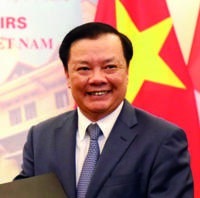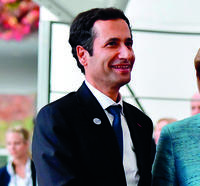The Banker's Finance Minister of the Year 2021 awards celebrate the officials that have best managed to stimulate growth and stabilise their economy.
Global and Europe
Bruno Le Maire, France
Over the course of 2020, The Banker’s Global Finance Minister of the Year Award winner — France’s Bruno Le Maire — has shown imagination and ambition to shepherd the world’s seventh largest economy through an unprecedented economic crisis. Though France, in common with Europe’s other major economies, has been hit hard by the fallout from the Covid-19 pandemic, the country’s near-term prospects have been ameliorated by the actions taken by Mr Le Maire’s Ministry of Economy and Finance.
Indeed, the fiscal envelope devoted to tackling the crisis to date is equivalent to 6% of gross domestic product, or €135bn, according to the International Monetary Fund (IMF). This is in conjunction with a suite of public guarantees to the tune of €327bn, the majority of which have been channelled to bank loans and credit reinsurance mechanisms.
Notable among Mr Le Maire’s extensive fiscal support measures have been direct efforts to support microenterprises, low income households and independent workers, coupled with a broad based temporary unemployment scheme. Alongside these steps have been interventions to enhance health insurance for the sick, as well as their caregivers, and to postpone social security and tax payments for companies, among other support mechanisms.
Beyond these fiscal interventions, in September 2020 the French government announced its ambitious two year €100bn “Plan de Relance”, a comprehensive fiscal package to support the country’s economic recovery with a focus on the green economy, infrastructure and industrial innovation. With an underlying priority to stimulate investment, almost one-third of the allocated funds will be spent in 2021. The plan is expected to contribute to the French economy reaching its pre-crisis level by 2022, according to statements from Mr Le Maire and French prime minister Jean Castex.
Moreover, it is indicative of Mr Le Maire’s forward-thinking approach to fiscal policy — developed in conjunction with the wider government — that the country’s recovery is being harnessed to modernise and reform the French economy over the longer term. At least €9bn, for example, is being invested in developing France’s domestic hydrogen industry. As the IMF notes, the wider plan could stimulate high levels of employment in the green energy sector, positioning France at the vanguard of global efforts to generate green-driven economic growth.
Mr Le Maire has demonstrated a robust approach to the taxation of technology groups
Mr Le Maire has also demonstrated a robust approach to the taxation of technology groups. In October 2020, France unilaterally imposed a digital levy on tech businesses after talks involving the Organisation for Economic Co-operation and Development failed to reach an agreement on the rollout of a global digital tax. Though the move is likely to reignite trade tensions with the US, which has threatened to hit France with tariffs on a range of products, it points to the French finance ministry’s willingness to pursue and execute its fiscal objectives in this domain ahead of many counterparts in Europe including the UK, Italy and Austria. In 2020, France is expected to accrue €400m from this levy.
Securing the Global Finance Minister of the Year Award is no easy feat, but Mr Le Maire’s forward-thinking, ambitious approach to policy making sets him apart in a fiscal landscape changed beyond all recognition.
Finance Minister of the Year, Americas
Ignacio Briones Rojas, Chile
In early March 2020, when its first case of Covid-19 was officially reported, Chile was a divided country shaken by social unrest and bitter dissatisfaction with the political class. What began with something that might seem trivial — a government decision to raise ticket prices on the Santiago metro at the end of 2019 — quickly snowballed into violent protests in the streets.
In such an environment, finding public financing solutions amid the enormity of the pandemic required much more than the intellectual acumen usually expected of a finance minister. But Ignacio Briones Rojas, appointed when his successor became a political casualty of the social unrest, has proven his worth.
He secured a $28bn emergency package that included provision for Chile’s poor and subsidies to create jobs, thereby addressing Chileans’ anger at the social inequality that fuelled the public protests.
Mr Briones Rojas should also be lauded for pushing ahead with his ministry’s work creating sustainable funding tools for capital market investors. After becoming the first sovereign to issue green bonds in Latin America in 2019, Chile issued its first series of social bonds in November 2020. Worth a combined $2.1bn, the sustainable bonds will go towards supporting households, funding education and health services, and strengthening efforts to alleviate the impact of Covid-19.
The notes were placed two short weeks after the country released guidelines that define those new products, which complement its green bond framework, and which the country created to reflect international standards. Indeed, international investors bought 48% of the amount available, twice the previous record for a sovereign issuance, according to the ministry. The social bonds represent a sizeable part of the government’s $12.5bn issuances in 2020 and are part of its plans to further diversify its investor base by strengthening its appeal to investors seeking environmental, social and governance assets.
Mr Briones Rojas insists on Chile’s ability to maintain fiscal prudence. Greater emphasis on addressing inequality can only improve the country’s chances of a brighter, more sustainable future.
Finance Minister of the Year, Asia-Pacific
Dinh Tien Dung, Vietnam
Vietnam’s economy has been one of Asia’s most robust in recent years, something which is no small part down to the work of finance minister Dinh Tien Dung. Holding the role since May 2013, he has overseen the growth of domestic manufacturing, spurred by the move from Chinese companies to lower cost neighbours.
The result is a strong economy, even in the face of the pandemic. The International Monetary Fund stated in October 2020 that it would be revising up its gross domestic product (GDP) forecast for Vietnam, increasing the figure by 0.8% to 2.4% for the year. With a strong recovery expected in 2021, the country could well experience 6.5% increase in GDP this year.
Vietnam took a swift, cohesive approach to tackling the pandemic from the outset. Mr Dinh set out the government’s response to Covid-19, with a fiscal support package valued at VND291.7tn ($12.6bn) implemented, representing 3.6% of the country’s GDP. Tax has been cut, with deferments to the payments of VAT and corporate income tax (CIT), and small and micro finance companies seeing CIT cut by 30%. The Ministry of Finance has looked at extending some of its tax relief measures through to June 2021.
Further, to promote farming, the ministry has introduced an annual VND7.5tn tax exemption for agricultural land use between 2021 and 2025. There are further plans to tax fallow land in order to promote greater investment in, and use of, agricultural land.
Meanwhile, the government has stated that it would not put economic stability above supporting public health during the pandemic, and has seen just 35 fatalities caused by coronavirus (as of December 15, 2020).
Aside from the pandemic, Mr Dinh has pushed forward with his policy of increasing transparency in government spending and reducing corporate corruption. He called for an investigation into alleged bribery at a manufacturer. To increase trust in the government, he oversaw the creation of an open budget portal, which will provide transparency in government operations and provide accountability on the allocation, management and application of public resources.
Looking to the future, Mr Dinh has ensured the country will have strong international partnerships. Vietnam signed a free trade agreement with the EU in June 2020 before becoming part of the newly-signed Regional Comprehensive Economic Partnership.
Finance Minister of the Year, Africa
Mohamed Benchaaboun, Morocco
Morocco’s economy has been severely hit by the Covid-19 pandemic’s impact on global supply chains, tourism and remittances, as well as by drought. The country’s economic output contracted by 13.8% in the second quarter of 2020, according to the World Bank.
Under Mohamed Benchaaboun’s leadership, the Economy, Finance and Administration Reform Ministry (MEFRA) has steered a steady course through the crisis. The country launched an ambitious post-crisis stimulus plan, including a Dh120bn ($13.4bn) injection into the economy in July, equal to 11% of gross domestic product.
Mr Benchaaboun was appointed as minister of economy and finance by King Mohammed VI in August 2018, with a clear mandate to address Morocco’s social and economic problems. Two months later, he was reappointed and given the added portfolio of administration reform. He is a seasoned banker, previously CEO of Morocco’s Central Popular Bank (BCP), and also served as an expert for the IMF.
Within a year of his appointment, Mr Benchaaboun was tackling income tax disparity, promoting new measures to establish a fairer tax system, as well as fighting tax evasion and fraud. He has also been tough on all forms of corruption, submitting a parliamentary bill covering transparency, integrity and governance in September.
During the Covid-19 crisis, Morocco has mobilised financial support from several multilateral institutions, including $3bn from the IMF’s Precautionary and Liquidity Line, €200m from the European Investment Bank and €300m in loan guarantee agreements from the European Bank for Reconstruction and Development.
In addition to raising money from international institutions, the country also tapped the global markets. In September, Morocco issued a €1bn Eurobond in two equal tranches, with the order book exceeding €2.5bn. Ahead of the issuance, Mr Benchaaboun led a “NetRoadshow” to highlight the country’s resilient macroeconomic framework and recent reforms. In December, it issued a $3bn bond in three tranches; the order book attracted more than four times its value.
The International Finance Corporation, for one, has praised the country’s rapid measures to support the private sector. For example, Morocco launched two major loan guarantee programmes in June, Relance TPE and Damane Relance, which the minister reports have helped 80,000 micro, small and medium-sized enterprises relaunch their activity and protect them from bankruptcy.






